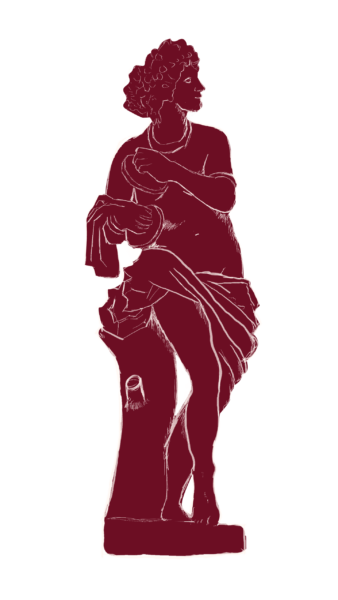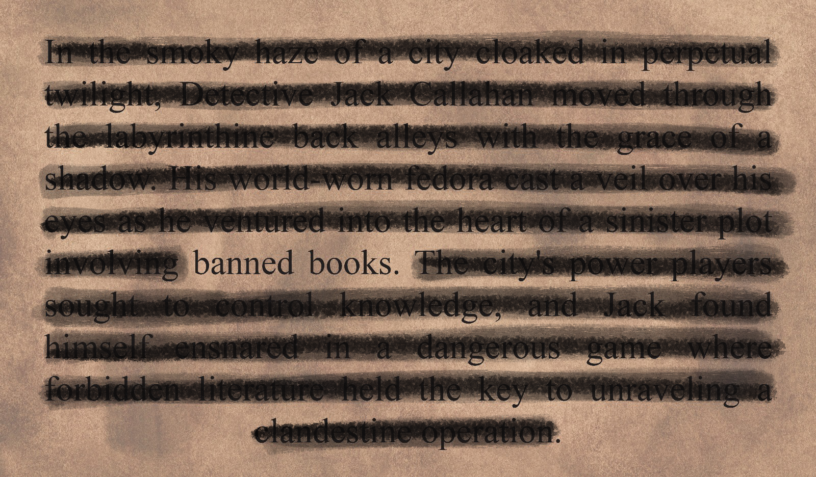Words by Melanie Nava Urribarri
Visuals by Brithi Sehra
In a dark storage locked away or in a cupboard untouched by day, dust-covered books sit on a dark shelf. The ghosts of the countless silenced voices echo in the wind, unable to slip through the cracks of their confinement. There are over 50 titles—narratives of the heart—experiencing this treatment. The treatment of a banned book.
Yet, curious eyes find these books challenged and out of reach. Daring hands pick these titles up, read their contents and think, “Why?” Why have these stories been hidden?
“That’s not fair,” said Hirni Trivedi, a second-year arts and contemporary studies student at Toronto Metropolitan University (TMU). “[These books] talk about some very important topics. Like The Handmaid’s Tale,…these writers are basing their pieces of fiction on something present in society…I think people should be allowed to read it.”
Early this year, the Toronto Public Library (TPL) published a list of challenged and banned books in the hopes of taking a stance on the disputed titles, with initiatives starting soon after to protect banned books. This has made TMU students like Trivedi question the reasons behind the censorship.
Some favourite stories and impactful perspectives are found on that list, such as The Handmaid’s Tale by Margaret Atwood, The Kite Runner by Khaled Hosseini, 1984 by George Orwell and The Hunger Games by Suzanne Collins. The list far from stops there, impacting not just public libraries, but school libraries and curriculums as well.
According to Dr. Arne Kislenko, a professor at the department of history at TMU, book banning is “as old as humankind in so many different ways.”
“It’s been a time-honoured practice pretty much everywhere in the world for well [over] 2,000 plus years,” he said.
He explains that the first evidence we have of book banning goes back to the ancient Chinese empire of the third century BC, where Confucian scholars, followers of the Chinese Confucius philosophy, were sometimes buried alive by Chinese emperors because of the things they wrote.
Kislenko adds that in ancient Rome, The Odyssey by Homer was banned by Caligula for being thought of as “dangerous”. He also explains that in Medieval Europe, books such as the Christian Bible were banned, along with Shakespeare over different centuries and movements. On the Origin of Species by Charles Darwin was banned for teaching evolution in the United Kingdom and the United States. Les Miserables by Victor Hugo was also banned on different occasions by the Church.
And the list over time goes on.
Now, in present-day Canada, a wave of discomfort wafts over TMU students as they learn about the banned titles. “I myself read To Kill a Mockingbird [by Harper Lee] in high school. It was such an eye-opener for me on the history of racism. It does the job really well…I think they should definitely remain a part of the school curriculum,” said Trivedi.

The reality of book banning feels surreal when experienced in a country where freedom of expression is a right. According to section two of The Canadian Charter of Rights and Freedoms, everyone has the fundamental right of “freedom of expression.” But, history is known to repeat itself—events of societies looping like a merry-go-round with highs and lows.
The issue of censorship has risen again with a greater force in its loop with tensions rising within it.
In an in-person interview, anxiety is heard in the voice of third-year biology student Fabian Ramirez. His eyes visibly narrow in consideration of the questions, and his mouth twists in worry as the conversation about banned pieces of literature continues.
Ramirez says he feels the population is being “lulled into complacency” and that “by deeming these books controversial, [those in power] have control over the narrative.” He highlights in his points that he thinks it isn’t about the books being controversial, but rather that they send a message.
The books we read are a reflection of the world and its stories.
“When it comes to books like 1984 and Brave New World [by Aldous Huxley]…I remember thinking how this is such an accurate representation of how the world was, how the world is and I feel like how the world would continue to be, lest we heed the advice from those books,” says Ramirez.
There is an understanding among some TMU students that these challenged books are necessary to understand crucial topics. Hidden behind their messages are conversations around the universal and societal issues that persist today.
“I always have made it a point to read the books that they ban because I’m concerned that if the school board blocks these books from our accessibility and doesn’t let teachers give these books to students, we’re not able to fully understand the world that we live in,” adds Ramirez.
He isn’t the only student with these sentiments.

Third-year kinesiology student Daniela Arabit reflects similar sentiments. “[Banning these books] can affect education because then they’re just limiting the kind of books that [students] can read. I think reading a bunch of different genres like fictional or non-fictional … [is] good [in order] to have a broad perspective on everything. Even if it’s fiction, you can learn so much,” says Arabit.
Book censorship, especially within schools, has been a long-discussed topic. Canadian librarian Cordelia Tindall, with experience in both elementary school and public libraries, says censorship in libraries can be more nuanced. “We think about censorship [as] taking away books that are not appropriate, but as a librarian, you’re always making those judgement calls when you’re making purchases for your library,” she says.
From library to library, the opinion of the community will be widely reflected in the content offered. Sometimes, there is the issue of funding for these institutions, making them pickier about what should and shouldn’t go on shelves.
“[In school libraries], I felt [it] was my role to support the teacher and what they were doing in their classroom. Some content is just considered to not be appropriate for children,” says Tindall.
This level of control, however, can still be wrongfully biased. Hand in hand with her daughter and husband, the murmuring sounds of voices in the public library surrounding them, along with the old smell of books, Tindall says that she had been looking forward to picking out children’s books including same-sex relationships as a way to introduce her daughter to these topics.
Tindall recalls they picked out a book about two kings getting married.
“It had big warnings [plastered] all over this book …[saying] ‘adult content warning’ like we were taking out pornography,” says Tindall, as she then explains it was nothing but an innocent children’s book about two male characters falling in love, much like a classic fairy tale.
“It was sad that this library looked at it as being this terrible literature that only adults should be looking at. It made me so upset,” adds Tindall.
Such is the power of libraries and those who control them.

In a statement by the TPL, city librarian Vickery Bowels says, “It’s never been more important to stand up and speak out for intellectual freedom and to ensure voices, especially those of marginalized and equity-deserving communities, are not shut down.”
So how far can censorship go?
In the history of censorship, book banning hasn’t just been restricting access to books but has also been seen, for example, in the form of book burning.
Perhaps most infamously, in 1933 Nazi Germany, there were “massive wildfires at universities, no less banning books by Albert Einstein, Ernest Hemingway, Eric Remarque, Stalin, Trotsky, Thomas Mann, an endless list of people that the Nazis thought was disturbing,” said Kislenko.
Book burning has become one of the most recognizable and offensive acts from the perspective of academics in particular, according to Kislenko. “It’s an attempt to destroy ideas and the currency of history everywhere. The currency of all people is in ideas,” says Kislenko, who explains that these measures have historically been the beginning of a long decline as regimes are threatened.

He continued to say that book banning—and its extreme version of book burning—has usually been the hallmark of leaders who do not value democratic ideas and other principles. It becomes a complex route to a more authoritarian government, which has historically left negative impacts on society. People ban books because they don’t like the ideas written in them, often under the guise of threatening their children or the purity of their culture.
As such, there is an integral relationship between the book and those who wish to ban it.
Kislenko notes that “we pay a lot more attention to it today because many people see it as a fundamental wrong in terms of dealing pretty much with any topic.”
What hasn’t changed is that banning books, then and now, is dangerous because books can transform ideas and offer new outlooks.
From the perspective of the historian, banning books is equal to trying to ban ideas. While controversy can happen, it’s the role of educators and historians to be on the vanguard of trying to talk about why books are banned.
“Everybody should have an opportunity to convey their idea, even if we don’t like it, even if we find it offensive at some point in time. It’s that rigidity that I think is probably most disturbing,” adds Kislenko.
He talks about how while the closed-minded rigidity is not necessarily solved by education, in theory, educational spaces—universities in particular—are supposed to be where students hash out these ideas. This is where they can hold objective discussions about issues, freedom of speech, the need to protect people and pretty much every part of a book and its content.
“That is, I think, the front lines of this debate,” says Kislenko.
At TMU, the threat of censorship in literature and even media has become a very real topic. Students increasingly show concern as people begin to pay more attention.
Toronto is an incredibly diverse city filled with stories and ideas of people around the world. In a 2021 census from the City of Toronto, only around 47 per cent of residents were born in Canada. This makes diversity in curriculums and libraries crucial.
According to a report published in 2021 by the American Library Association—an institution largely affected by the banning of books—books by diverse authors make up only 15 per cent of the literature available to students in America.
Many of these challenged stories tell the historical tales of marginalized communities.
Saskia Wodarczak, a second-year english literature student at TMU, agrees that some communities suffer the consequences of having their stories banned. “It’s those stories that really say to their audience, ‘Hey, you know what, this did happen. And this is my account of it.’…If you’ve survived a big event, such as the Holocaust, your opinion and your experiences are a lot more valuable because you actually lived it,” says Wodarczak.
Wodarczak was especially surprised to see the graphic novel Maus by Art Spiegelman was banned. The story is about the author’s father’s experience during the Holocaust.
“In a world that is so about inclusivity and spreading marginalized voices, it’s very hypocritical for them to start taking these types of books off the list,” adds Wodarczak, continuing with, “It’s not great for the next generation…As a student, it’s kind of sad.”
On policies of censorship and freedom of speech, TMU has a statement on their website stating that, “[TMU] has long been committed to freedom of expression, including free speech. As a vital and dynamic university, TMU welcomes the opportunity to talk freely and openly. It is an incredibly valuable attribute that controversial subjects are not shielded, but rather discussed publicly, that attitudes are challenged, and that alternatives are suggested and considered. Everyone who is part of the University, as well as guests and visitors, have a role to play in this shared enterprise.”
“It is very difficult to ban without compromising further values and ideas in a society,” says Kislenko.










Leave a Reply